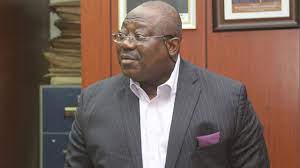I Want To Make Scapegoat Of Corrupt Officials In Civil Service- Olaopa
The Chairman of the Federal Civil Service Commission (FCSC), Prof Tunji Olaopa, on Wednesday, said his first task in the Commission under him will be to make a scapegoat of corrupt elements who soil the service’s image.
Prof Olaopa gave the hint while speaking to newsmen after his swearing-in as Chairman of the FCSC, along with eleven other members of the Commission.
President Bola Tinubu had performed a swearing-in ceremony for the FCSC members as well as the Chairman of the Independent Corrupt Practices and Other Related Offences Commission (ICPC) before he proceeded to preside over the week’s Federal Executive Council (FEC) meeting held in the B Council Chamber of the Presidential Villa, Abuja.
Fielding a question on what plans he has about reports and cases of corruption in the civil service, Olaopa who expressed lamented the situation, said he plans to collaborate with the security and law enforcement agencies in the process of redeeming the service’s image.
“Certainly, it’s very disturbing. The commission, by its conception, is supposed to be a beacon of integrity and those that founded, our predecessors in the glorious days of the service, gave Civil Service Commission a great name,” Olaopa said.
“So, I’m disturbed by the whole cash-and-carry reputation that the commission… and for me, we’ll do everything possible, in collaboration with some of the intelligence and security agencies, to make a few scapegoats and communicate a new image for the Service Commission.
“That will be our first charge and we would all be committed to bring back values, institutional values, to the public service of Nigeria,” he said.
“The charge given to us indicates that the administration has put the Civil Service in the Renewed Hope Agenda. So there is a specific charge for every stakeholder, including the Office of the Head of Service, to collaborate, to come to the sense that the Civil Service has challenges and that we need to reposition.
“We need to beef up the capability readiness, we need to modernize by deploying technology. We need to reinstitute professionalism and competency-based human resource management. We need to move this Civil Service to a position where they could help governments to deliver on its agenda and that we are poised to be able to do.
“From the end of the Civil Service Commission, we want to rebrand this commission. We want a commission that represents the integrity phase of the Civil Service. We want a commission that promotes the cherished values of the public service in everything that it does”, he said.
Also fielding questions, the new ICPC Chairman, Dr Musa Adamu Aliyu, said he would be leading the Commission by example, just as he hopes to work to realize the Tinubu administration’s Renewed Hope Agenda.
“I have taken the oath of office, I’ll abide by the oath of office, and I will discharge my duties in accordance with the ICPC Act, to support the Renewed Hope Agenda of Mr. President. I want to assure Nigerians and Mr. President that I will lead by example and I’ll also live above board and I will abide by my oath of office,” he said.
President Tinubu swore-in Dr Aliyu as the new Chairman ICPC and Professor Olaopa as FCSC, along with eleven other members of the Commission.
According to a citation read by the Special Adviser to the President on Media and Publicity, Ajuri Ngelale, the new ICPC Chairman served as the Attorney-General and Commissioner for Justice in Jigawa State, between 2019 and 2023.
The new Chairman of the Federal Civil Service Commission, Professor Olaopa, from Oyo State, is an academic and former Permanent Secretary, who has had a stint both at the university and served as Permanent Secretary across five ministries.
Those who also took oath as members of the FCSC include members representing Adamawa, Gombe, and Taraba, Dr. Daudu Jalo, Gekpe Isu (Akwa Ibom and Cross River), Dr. Chamberlain Nwele (Anambra, Ebonyi, and Enugu), Rufus Godwins (Rivers, Delta and Bayelsa), Dr. Adamu Hussein ( Niger and the FCT) and Aminu Nabegu (Jigawa and Kano).
Others were Hindatu Abdullahi (Kaduna and Katsina), Shehu Aliyu (Kebbi, Sokoto, and Zamfara), Odekunle Aduke (Kogi and Kwara), Jide Jimoh (Lagos and Ogun) and Dr. Festus Oyebade (Osun and Oyo).





